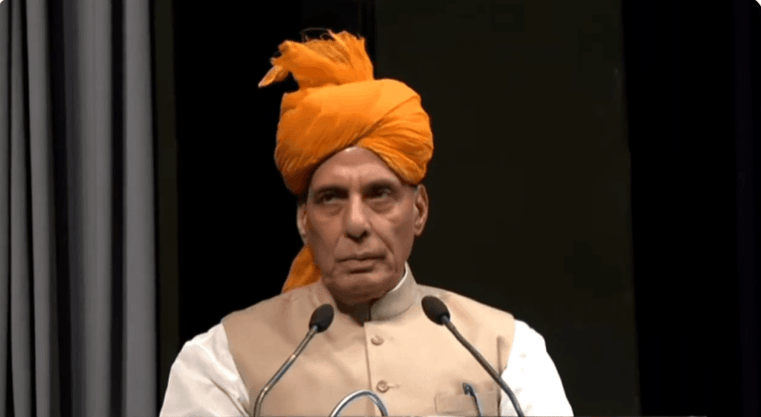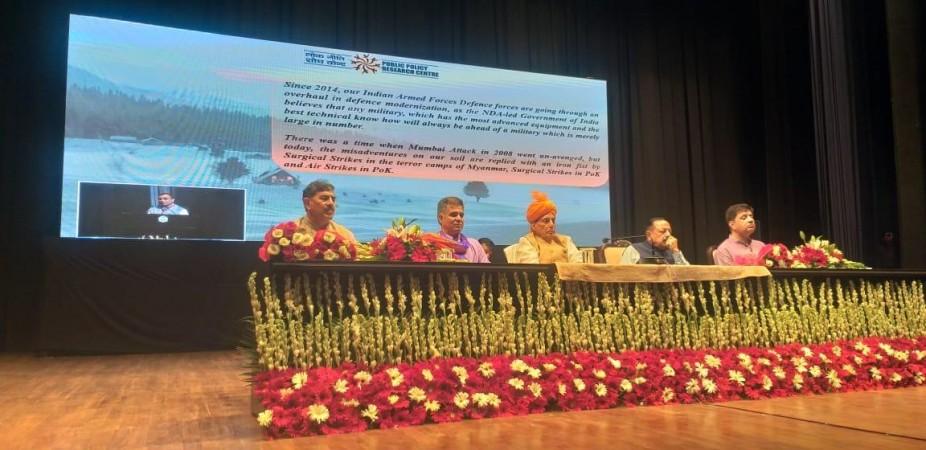Defence Minister Rajnath Singh on Monday said that Pakistan has illegally occupied a huge portion of the erstwhile state of Jammu and Kashmir.
He, however, asserted that Pakistan Occupied Jammu and Kashmir (POJK) is, was, and will remain a part of India and the Pakistan government will achieve nothing by repeatedly claiming PoJK. The defence minister said that by illegally occupying PoJK, Pakistan does not have any locus standi on that part of Jammu and Kashmir.
Mentioning towards 1994 Parliament resolution to liberate PoJK from the yoke of Pakistan, he said, "A unanimous resolution has been passed in the Parliament of India regarding PoJK that it is a part of India only. Not one but at least three proposals of this intention have now been passed in the Parliament".
Rajnath Singh was addressing a "security conclave" at Jammu University on internal and external dimensions of the country's defence mechanism.

"A large part of Jammu and Kashmir is under the occupation of Pakistan. People on the other side are seeing that people are living their lives peacefully in J&K. People living in PoJK going through a lot of suffering and they will raise demand to go with India".
Parliament Resolution of 1994
On February 22, 1994, both Houses of the Indian Parliament passed a resolution unanimously, stating that Pakistan has been occupying areas of India in Jammu and Kashmir and the Indian Government is committed to taking back the occupied areas.
It also stated that Pakistan was using the occupied territories to train and launch terrorists in India and asked Pakistan to desist from terror-supporting activities. The resolution reiterated that the State of Jammu & Kashmir is an integral part of India and demanded that Pakistan vacates its occupied areas.
It advised Pakistan against violating the Shimla Agreement by trying to internationalize The Kashmir issue. Two more causes of concern related to the abysmal human rights violations and conditions of people living in Pakistan-occupied areas of Jammu and Kashmir were also part of the resolution.
Text of the resolution
"This House note with deep concern Pakistan's role in imparting training to the terrorists in camps located in Pakistan and Pakistan Occupied Kashmir, the supply of weapons and funds, assistance in the infiltration of trained militants, including foreign mercenaries into Jammu and Kashmir with the avowed purpose of creating disorder, disharmony, and subversion:
Reiterates that the militants trained in Pakistan are indulging in murder, loot, and other heinous crimes against the people, taking them hostage and creating an atmosphere of terror;
Condemns strongly the continued support and encouragement Pakistan is extending to subversive and terrorist activities in the Indian state of Jammu & Kashmir;
Calls upon Pakistan to stop forthwith its support to terrorism, which is in violation of the Simla Agreement and the internationally accepted norms of inter-State conduct and is the root cause of tension between the two countries reiterates that the Indian political and democratic structures and the Constitution provide for firm guarantees for the promotion and protection of human rights of all its citizens;
regard Pakistan's anti-India campaign of calumny and falsehood as unacceptable and deplorable.
Notes with deep concern the highly provocative statements emanating from Pakistan urges Pakistan to refrain from making statements which vitiate the atmosphere and incite public opinion;
Expresses regret and concern at the pitiable conditions and violations of human rights and denial of democratic freedoms of the people in those areas of the Indian State of Jammu and Kashmir, which are under the illegal occupation of Pakistan;
On behalf of the People of India,
Firmly declares that-
(a) The State of Jammu & Kashmir has been, is and shall be an integral part of India and any attempts to separate it from the rest of the country will be resisted by all necessary means;
(b) India has the will and capacity to firmly counter all designs against its unity, sovereignty and territorial integrity;
and demands that –
(c) Pakistan must vacate the areas of the Indian State of Jammu and Kashmir, which they have occupied through aggression; and resolves that –
(d) all attempts to interfere in the internal affairs of India will be met resolutely."
The Resolution was unanimously adopted.
Articles 370 and 35-A were the main hurdles in bringing people of J&K to the mainstream, says defence minister.
Observing that articles 370 and 35-A were the main hurdles in the socio-economic growth of the residents of Jammu and Kashmir, the Defence Minister said that the BJP-led government at the Centre abolished these articles to end discrimination with the residents of J&K.
He said that the common people of Jammu and Kashmir were kept away from the mainstream of the country for a long time due to these articles which were the hindrance in taking action against any anti-national force.

He further said that the general public is happy with the decision of abrogation of Article 370. "The trouble is only for those whose shop of hatred and separatism is getting closed," Singh said. Talks going on at military and diplomatic levels to solve the border issue with China
The Defence termed the border situation with China as a matter of perceptional difference, but there are agreements and protocols, based on which the armies of both countries carry out the patrolling.
Delivering a keynote address on ‘India’s National Security’ in Jammu.
— Rajnath Singh (@rajnathsingh) June 26, 2023
https://t.co/uBqbc3iKOd
Referring to the stand-off in East Ladakh in 2020, he said, the Chinese Army ignored the agreed protocols and unilaterally tried to change the status quo on the LAC. He lauded the valour and dedication of the Indian Army which prevented the attempts by the PLA to change the status quo.
Rajnath Singh reiterated the Government's stand to resolve the border issue through dialogue and in a peaceful manner. He added that the talks are continuing at military and diplomatic levels to resolve the dispute. He assured the nation that the Government will never compromise on India's border, its honour, and its self-respect.
"We will never let the sanctity of our borders be violated," he added.

















